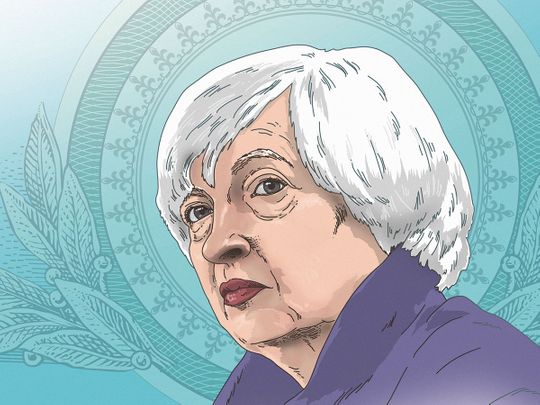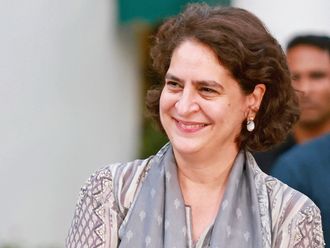
When the clock strikes midnight on New Year’s Eve, billions of people around the world will be wishing that 2021 brings much better fortunes than 2020. When coronavirus first emerged, this year was still weeks young — and how often have we wished it away? Small wonder then that ‘pandemic’ has been named word of the year.
But there is an economic price too to the pandemic. Those who keep track of such things estimate the global economy will take a huge hit. Trying to quantify such things is like trying to count grains of sand. But there are those who keep track of such things. When that crystal ball falls in Times Square to ring in 2021, it’s estimated the US federal debt will stand at $28 trillion, give or take a few hundred billion. Hey, if you’re worried about your credit card balance, try owing $28 — but with 12 zeroes tagged to the end. Now imagine you’re President-elect Joe Biden, overseeing the world’s largest economy and leading a nation that has seen 271,000 deaths and 13.8 million cases and counting, it’s pretty clear very quickly that you need a strong money man in control of the purse strings. And that’s why he has turned to Janet Yellen — yes, the first woman to be nominated as US Secretary of Treasury — to bring order to America’s finances and try to create enough money to allow Washington to lead its economy out of this mess. And hopefully that will have a knock on effect on all our finances too. That’s why Yellen’s nomination is newsworthy for us all. She’s been in a similar crisis before, leading the US Federal Reserve in the wake of the 2008 global financial crisis. She was even an economic adviser to former President Bill Clinton — and that was back in the day when America’s current account was in the black. It didn’t have national debt. Given the sheer scale of the federal deficit now and the need too for the incoming Biden administration to find money to spend its way back to positive growth, no one expects that balance sheet to turn positive anytime soon. But Yellen is America’s best chance now for putting its fiscal house in order and finding funds to stimulate growth, tackle unemployment and put money back in the pockets of Americans. And when that happens, they will buy more of our goods, services and products — which is good for all of us.
Being 74 years of age is not a normal time to begin a new job even if it is Secretary of Treasury. But these are not normal times. True, Yellen will have to be approved by the US Senate which, depending on the outcome of the two senate races in Georgia, might or might not be a cakewalk. But Yellen has credit in the political bank too. The former Berkeley economics professor has been through the process before and knows her way around more than a spreadsheet. Senator Chuck Grassley, the Republican chairman of the Senate Finance Committee said he expects Yellen to “get a favourable review” during confirmation hearings.
She has spent 12 years on the Fed including four years as second in charge and four years as chair. And during her tenure in charge, Yellen was known for focusing more attention on the impact of the bank’s policies on workers and the costs of America’s rising inequality.
President Donald Trump bucked Washington tradition when he opted not to appoint Yellen to a second four-year term at the Fed in 2016. Starting with Clinton in the 1990s, presidents kept on bank leaders appointed by their predecessors in an effort to depoliticise the bank.
At Treasury, however, Yellen will take on a key portfolio in the new administration’s efforts to “build back better”.
Since leaving the bank in 2018, Yellen has spoken out about climate change and the need for Washington to do more to shield the US economy from the impact of the coronavirus pandemic.
“We face great challenges as a country right now,” she tweeted after her nomination on Monday. “To recover, we must restore the American dream — a society where each person can rise to their potential and dream even bigger for their children. As Treasury Secretary, I will work every day towards rebuilding that dream for all.”
As with other appointments made during the rather unusual transition process, President-elect Biden has opted for proven experience over enthusiastic exuberance. President-elect Biden’s picks include former Obama administration official Wally Adeyemo as deputy treasury secretary and economist Cecilia Rouse as chair of the Council of Economic Advisers. If confirmed, both would be the first African Americans in those roles.
Speculation over whom the incoming president would choose to lead Treasury had been particularly intense after he said he would choose a history-making appointee — leading many to speculate that he would choose either a Black or a female nominee to be the Treasury’s 78th chair. Yellen is used to cracking glass ceilings and was the first woman to chair the Fed when she succeeded Ben Bernanke in 2014. She was the driver behind an accommodative monetary policy with historically low interest rates that aided economic recovery.
Although new to Treasury, the Brooklyn-born Yellen is, in many ways, back on familiar ground. A Yale Ph.D graduate, she also lectured in economics at Harvard and has a history of economic policymaking that stretches back decades, including a stint as president of the San Francisco Fed from 2004 to 2010. Since stepping down as Fed Chair, Yellen has worked as an economist at the Brookings Institution.
In 1977 Yellen met economics academic George Akerlof at a Federal Reserve lunch. He wasn’t just a soul mate but an intellectual equal with similar views about the societal impact of economic policy. A year later they were married and together have one son.
Akerlof won the Nobel Prize in economics in 2001 and teaches at Georgetown University in Washington. No doubt, the two manage to keep their household finances in order. Yellen’s challenge now is pretty similar — just on a massively increased scale.
Mick O’Reilly is the Gulf News Foreign Correspondent based in Europe








